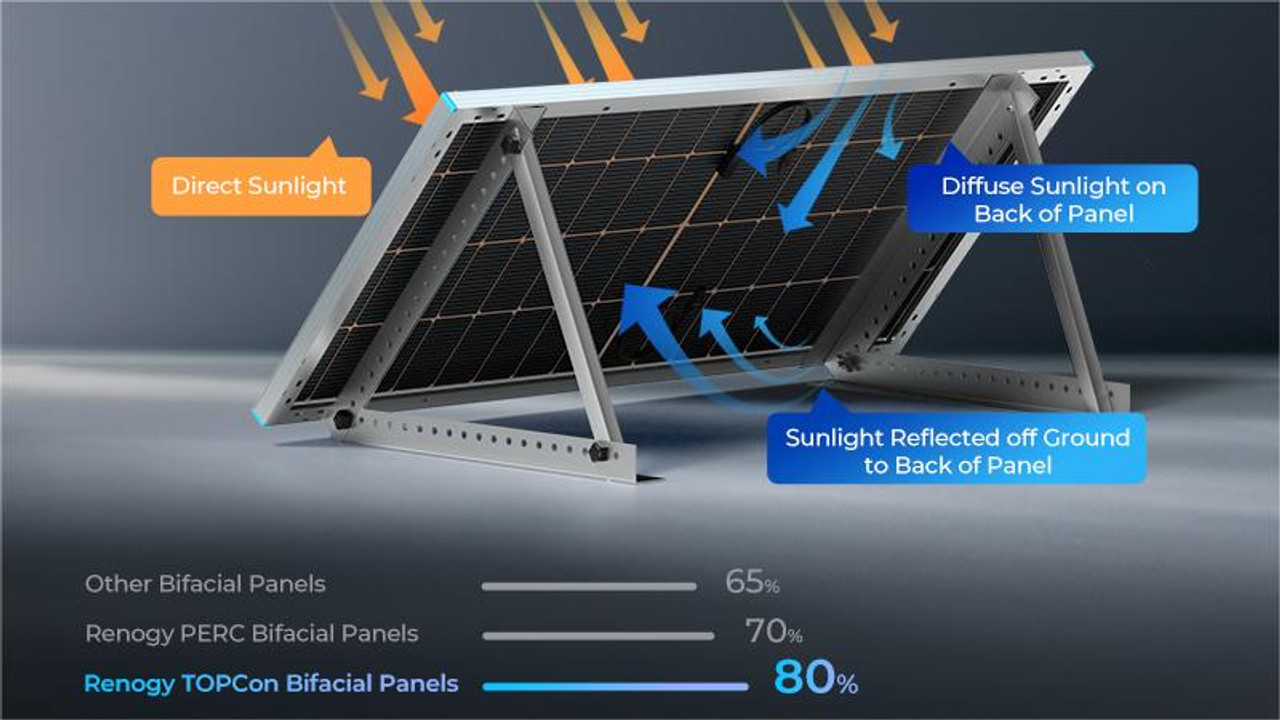Renogy 250W N-type Bifacial Solar Panel: Premier Option for Marine Use
Bifacial solar panels have gained popularity for marine applications. They’re not only capture sunlight from the front, but have the ability to generate power from both sides.
N-type Bifacial Solar Panels are becoming a preferred choice for many, particularly marine enthusiasts.In this article, we'll explore why n-type solar panels stand out from p-type panels and why n-type bifacial solar panel a wise choice for marine use.
What’s the Difference Between N-Type and P-Type Bifacial Solar Panels?
The Core Difference: Cell Efficiency
N-type solar cells are produced by adding a small amount of phosphorus to silicon, imparting a negative charge and earning the label "n-type." Conversely, p-type cells are doped with boron, resulting in a positive charge and the designation "p-type." These material distinctions influence the efficiency of each panel in converting sunlight into electricity. In this regard, N-type cells outperform P-type cells in conversion efficiency.
Bifaciality Factor
One of the standout features of n-type solar panels, such as the Renogy 250W n-type Bifacial Solar Panel, is their impressive bifaciality factor. This term sounds technical, but it’s actually pretty straightforward. It refers to the panel's ability to capture and convert light on both sides.
N-type panels typically boast a bifaciality factor of around 80%, while p-type panels usually have a lower bifaciality factor of around 70%. Although this may not seem like a huge difference, it adds up, especially when you consider that the rear side of an n-type panel can deliver approximately 14% more power than a p-type. This can be a major advantage when you’re relying on solar power in unpredictable conditions such as being on a boat.
Why are N-Type Bifacial Panels the Smart Choice for Marine Use?
Imagine you’re out at sea on a sunny day. It sounds perfect, right? However, the frequently changing weather and temperatures at sea can lead to unstable energy supply or even significant drops in power levels. This is especially true during cloudy weather or high-temperature periods.That’s where n-type bifacial solar panels come into their own, and are a smart choice for boats and yachts.
Higher Performance in Low Light Conditions
The weather at sea can change in an instant, from clear blue skies to overcast horizons. With changes like these, light conditions fluctuate and solar panels need to adapt quickly. N-type solar panels such as the Renogy 250W Bifacial Solar Panel are particularly great at this.
Thanks to their advanced technology, they perform impressively well in low-light conditions. So, whether it’s a cloudy day or the early hours of the morning, these panels keep churning out power when you need it most.
Superior Performance in High-Temperature Conditions
Solar panels typically stop working as temperatures rise. However, n-type TOPCon solar panels incorporate technology with a low temperature coefficient of -0.29%/C, resulting in relatively stable performance even in high temperatures. This resilience proves particularly beneficial during hot summer travels, especially in marine environments where solar equipment is exposed to intense sunlight and reflective surfaces.
Key Benefits of the Renogy 250W N-Type TopCon Bifacial Panel
Designed with durability and versatility in mind, the Renogy 250W n-type panel is not only a top pick for marine use, but also perfect for RVs and cabins. With IP68 protection, this panel is designed to stand up to dust, sand, and even a drop in the water if that happens. This makes it ideal for harsh conditions as it’s very reliable.

Some of the key features of Renogy 250W n-type TOPCon Bifacial solar panel include:
- 25% cell efficiency.
- 16BB for higher conversion efficiency & longer lifespan.
- 80% bifaciality factor for 14% more power from the rear side compared to the p-PERC counterpart.
- -0.29%/℃ low temp coefficient. Better performance in high temps.
- IP68 protection.
- 10-year material and workmanship warranty. 25-year performancewarranty.
- Compatibility with 99% of charge controllers, easy integration with your existing solar systems.
Final Thoughts
The bottom line is that the Renogy 250W n-type Bifacial Solar Panel offers a comprehensive solution for anyone looking to enhance their off-gridenergy setup in marine or other applications. Sounds like it’s right for you? Check it out today!








